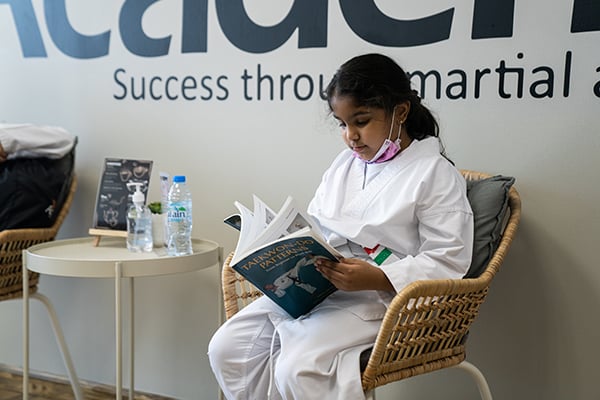Good habits and great character traits are invaluable. But what exactly do good character traits and habits look like, and why do they matter?
 Excellent character is being the very best version of yourself; capable of empathy, kindness, and gratitude, as well as prioritising respect, integrity and honesty. Good habits are about making good decisions, so that the choices you make concerning all aspects of your life are rewarding and beneficial.
Excellent character is being the very best version of yourself; capable of empathy, kindness, and gratitude, as well as prioritising respect, integrity and honesty. Good habits are about making good decisions, so that the choices you make concerning all aspects of your life are rewarding and beneficial.
Every parent and guardian wants their child(ren) to develop good habits and character, and help them possess the skills they need for a successful future. It’s important for our kids to reach their full potential so they can enjoy life to the full.
Character and habits make a difference to mental, physical and emotional wellbeing. Healthy habits are essential to live a healthy, happy life. Quality character enables people to put themselves in the best position to be successful and thrive.
How then does a child develop beneficial habits and an outstanding character?
How Does A Child Develop Habits?
Children are very impressionable - the younger they are the more impressionable they are, so good habits are more likely to develop if encouraged from an early age. A nurturing and supportive environment with secure boundaries provides a safe space for children to learn rewarding habits.
Good habits concern choices around food, sleep, exercise, and how time is spent. These decisions affect mental and physical health, and therefore it’s vital that children develop beneficial habits that will serve them through life.
Lead By Example
 The majority of habits developed by children are learned from you - their primary carers. Children imitate and develop habits learned from those closest to them, so it’s vital that you lead by the example you wish your children to follow.
The majority of habits developed by children are learned from you - their primary carers. Children imitate and develop habits learned from those closest to them, so it’s vital that you lead by the example you wish your children to follow.
Make good choices about food, take time to rest, and spend your time wisely. When your children see you enjoying nutritious food, resting when tired and being purposeful with time, they are likely to copy.
When you choose to spend your time doing activities that support you and the people around you, your children quickly learn how to spend their time wisely, and develop helpful habits.
Routines and Boundaries
Routines help to establish natural boundaries and habits. When you provide an environment in which children learn when to wake, eat, play and rest throughout the day, it not only provides a sense of security around what to expect, but it also builds an understanding about how to help themselves feel healthy and happy.
Likewise, secure boundaries teach children where the safe limits are for themselves and others. It’s crucial, even from a very young age, for caregivers to provide an explanation for any boundary. This helps you as the guardian to assess your reason behind the boundary and ensure it’s valuable. It also provides children with an understanding and appreciation for the boundary, rather than simply following rules - which can lead to resentment and resistance.
Positive Perspective
 Remain positive in your thoughts, words and actions. When you keep a positive perspective, even when facing challenges, you show your ever-watching children how best to handle life's ups and downs.
Remain positive in your thoughts, words and actions. When you keep a positive perspective, even when facing challenges, you show your ever-watching children how best to handle life's ups and downs.
Life isn’t always easy, nor does it always go to plan, one of the most beneficial habits to pass on to your children is a positive perspective. A positive outlook is the best approach to any setback, and wisely teaches your youngsters that the right attitude can help manage even the most difficult day.
Similarly, be careful with how you talk about others. Your young people are always listening and will adopt your manner of talking. Make sure your speech is considerate and uplifting towards and about others as much as possible.
The same goes for how you talk to and about yourself. Minimise or better yet, remove negative self-talk. Your children are far less likely to be self-critical or discouraging towards themselves. Together you will find yourselves more confident and kind towards yourselves and others - the makings of a happy and positive mindset and approach to life.
Effective Communication
Similarly, let your communication with your children be clear and supportive. Teach them good habits around communication by initiating conversations with them often. Make time to connect by asking them questions about their day, their interests, what they’re struggling with. Try to limit distractions so that you can properly listen to one another.
By taking time each day to chat with your young people, you let them know they’re important. That what they have to say matters. You also show them how to ask questions and listen, so that they can develop good habits around communication for themselves. This is a vital skill for healthy relationships that will serve them well in all areas of their life.
How Does A Child Develop Character?
Great character is about the type of person you are, rather than the choices you make, although the two are intertwined.
Outstanding character sets you apart with values such as integrity, respect, responsibility, honesty, and care. These character traits develop through a number of influences in a child’s life, such as family, school, community and personal experiences. There are a number of ways as an influential adult in a child’s life, that you can guide and influence brilliant character.
Model Excellence
Be the type of person you would like your children to be, be their exceptional and inspirational role model.
Your behaviour will be an example to the young people in your life. Demonstrate honesty, reliability, integrity, kindness and empathy. Your children will experience first-hand the benefits and influence of good character. They will witness the positive impact it has on others, and how great character can help to build and support people and community.
When children see from a young age the personal happiness and wider benefits of good character, they will naturally imitate and desire it for themselves.
Use Setbacks To Guide
When mistakes are made, difficulties arise, or challenges appear, take the opportunity to guide and teach your young people. Help them to keep a positive perspective, and guide them when mistakes are made. Help them to discover what went wrong and why, discuss what they or others could have done differently, and what a better choice might look like.
Setbacks of any kind do not have to drag you down, instead these are the very occasions that teach and influence character growth.
Share Stories
Stories are a fantastic child-friendly way to share ideas around morals and values. Children can enjoy a story, practice empathy with the characters, and chat about the choices and experiences contained within the story. It’s a wonderful starting place for discussions about bigger ideas and are hugely valuable in guiding children around tricky topics.
Stories are engaging and an accessible option for introducing concepts that might not otherwise come up in everyday chats. Whether it be passed-down stories from your own or close family experiences, or written stories, make time for frequent story-telling. Your children gain so much from a simple tale of great character.
Act on It
Don’t just do the talking - act on what you say! Actions speak far louder than words. Show what good character looks like - volunteer in your community, get involved with local charities, help out at nearby events.
Lead the way by doing things that serve others around you. It could be as simple as having a cup of tea with a lonely neighbour, cooking a meal for the family with a newborn, or litter picking around your home.
Every small act of generosity and service goes a long way. You’ll reap rewards in your own life, and embolden your children to act with the same humble heart and magnificent character.
Want to learn more about how we help children to develop their character? Join our Facebook group and join in the conversation!


